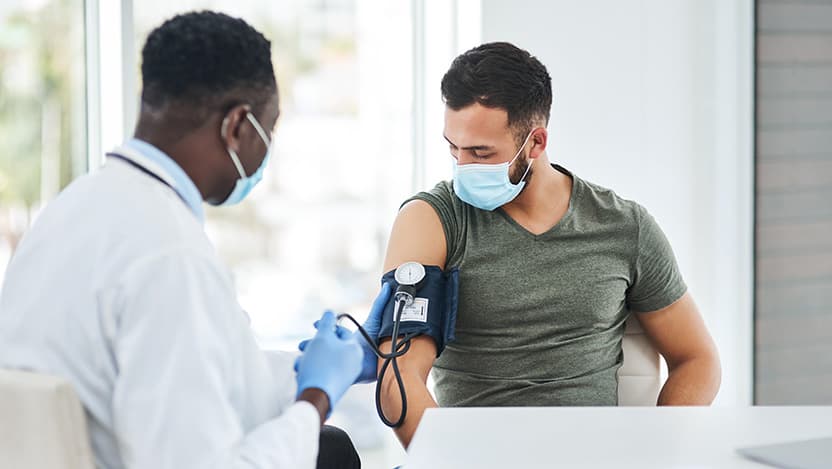Why young adults should have a primary care physician

Primary care physicians (PCPs) are the quarterbacks of medicine. Not only do they address health concerns from sore throats to chest pain, but they also plan and manage your health by connecting you with the right specialists.
Here's why it's important to have a PCP even if you are young and healthy, along with answers some common health questions asked by patients in their 20s and 30s.
What is a primary care provider?
It’s a doctor who specializes in seeing everyone, regardless of age, and who addresses patients' healthcare concerns and guides them in the right direction if the PCP is not able to address those accordingly. (Internists are primary care physicians who see adult patients, while family practice physicians see children and adults).
Even if you have no concerns, it's good to see a PCP for baseline blood work to have peace of mind going forward. High cholesterol, high blood sugar and sexually transmitted infections (STIs) don’t always present with noticeable symptoms. I often see young patients who feel perfectly well, only to find they have a medical issue they never fathomed having. You have even more of a reason to get a PCP and regular checkup if you have a biological relative with a strongly genetic illness like colon cancer. That changes our medical decision-making because you may qualify for a colonoscopy at 25 years old.
But I’m young and feel good, so why not save my money for other things?
Health problems get bigger, both physically and figuratively, over time. By the time you notice something is off, care will likely be more complicated, expensive and time-consuming than if you’d addressed it earlier. For instance, if you don't attend to obesity-related diabetes in your 20s and 30s, you’re not only going to pay more in your 40s and 50s for complications that have arisen over decades but you're also going to spend more time in and out of the hospital, and your loved ones will be tasked with looking after you.
What should I get tested for at an annual exam?
Make sure your doctor checks your blood pressure, cholesterol and blood sugar, and make sure you’re up to date with all of the age-appropriate screenings. If you’ve been sexually active, get tested for STIs as well. Check that you’re current with your vaccinations, including vaccines against tetanus, HPV and the flu. These may seem trivial, but they go a long way in ensuring you’ll stay on top of your health concerns.
How long does alcohol stay in your system?
Between 12 and 24 hours. If you’re at all concerned about the amount of alcohol you’re consuming, talk to your doctor. Chronic alcoholism can lead to organ damage and liver failure. We can also provide services including counseling and group therapy, as well as medications for those who wish to cut down on their alcohol and tobacco use.
How do you get a UTI?
Urinary tract infections (UTIs) are caused by bacteria infecting the bladder, urethra, or any other part of the urinary system. They’re more common in women because they’re anatomically more prone to getting them. UTIs require close follow-up by a physician because if your issue doesn't completely clear up, you can develop a chronic infection that can cause organ damage in severe cases.
It’s something to remember if you go to an urgent care clinic: Urgent care addresses a problem that needs attention that day, but follow-up care isn’t available. The latter can be a crucial part of your recovery to make sure the issue is adequately treated and you avoid complications.
How do you get HPV?
If you’re sexually active, at some point, you’re likely to be exposed to the human papillomavirus (HPV) through vaginal, anal or oral sex. That’s why it's good to get vaccinated against HPV sooner than later. You should also make sure you had the hepatitis A and B vaccine as a child. STIs are often the No. 1 concern of my younger patients. Not everyone uses proper protection like condoms, and some STIs have no symptoms. If you don't address STIs in a timely manner, not only can you suffer from a wide range of symptoms affecting many different parts of your body, but they can also strain your relationship with your loved one.
Is vaping bad for you?
Vaping is one of the more toxic, malignant forms of tobacco use that can damage and decrease your lung function, sometimes permanently. We physicians are tasked with providing counseling and making sure people don’t engage in toxic behavior.
What health issues should I keep an eye on?
If you’re young and healthy, focus on your blood sugar and blood pressure. These can be easily checked at home or a local pharmacy. Be aware of visible signs or changes in your body, such as any sort of discharge or skin lesions like unusual-looking moles. Most of the time there's something wrong, your body will try to signal this to you.
Edward Kim, MD, is a UChicago Medicine Medical Group provider. UChicago Medicine Medical Group is comprised of UCM Care Network Medical Group, Inc. and Primary Healthcare Associates, S.C. UChicago Medicine Medical Group providers are not employees or agents of The University of Chicago Medical Center, The University of Chicago, or UChicago Medicine Ingalls Memorial.

Edward J. Kim, MD
Edward Kim, MD, is a UChicago Medicine Medical Group provider who specializes in primary care and treats men, women and children of all ages.
View Dr. Kim's physician bio